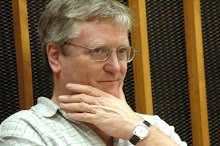Last week I went to see the Northern Broadsides production of Othello and I haven't been able to stop thinking about it since. It was clear, the performances were excellent, it was moving, frightening, and three of the fastest hours I've spent in a theatre, and that is no mean praise because put me in a comfy seat, turn the lights out, and it's up to you to keep my attention.
One of the things you tell writers on workshops is that the most powerful thing you can do is put the audience in charge by giving them information that that is not available to the characters, and Othello is a master class of how to do it. From the moment Iago opens his mouth we know exactly what is going to happen. His technique is reminiscent of Max Wall who would inform you he was going to tell you a joke, outline what it was about, explain how it worked and where you were going to laugh, and then, tell it, and you laughed exactly where he said you would. Iago is a poisonous, twisted, evil monster, and yet he is funny and full of life and energy. I've just finished script reading and almost every play was written with passion about a cause or an issue that the writer felt deeply about, and in every case, those characters represented the opposition to the writer's own views were cardboard cutouts without an ounce of life in them. Can't say that about Iago.
It was the first production I've seen that captured the pettiness of Iago's imagined slight. Othello feels he's conferring a favour by keeping his beloved Iago close to him, Iago feels passed over for a new friend, Cassio. Straight back to the playground. But how often after the most terrible crime do we find out that the mayhem was precipitated by the daftest of reasons? And what about the end where, when questioned, Iago, who has poured words all over the play from the opening merely says,
Demand me nothing. What you know, you know.
From this time forth I never will speak word.
Shakespeare, what can you say?
There ain't half been some clever bastards.
Ian Dury
Subscribe to:
Post Comments (Atom)

No comments:
Post a Comment